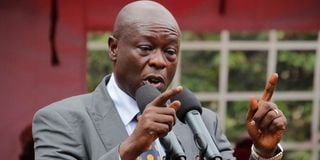Premium
High Court declines to issue orders stopping DP Rigathi Gachagua impeachment

Deputy President Rigathi Gachagua.
The High Court has declined to temporarily stop Parliament from commencing the process of impeaching Deputy President Rigathi Gachagua.
Former United Democratic Alliance (UDA) Secretary-General Cleophas Malala on Monday rushed to court in a bid to stall the impeachment process, arguing that Parliament was illegally constituted over the failure to adhere to the gender rule.
However, High Court judge Bahati Mwamuye certified the case as urgent and directed parties to appear before him on October 10, for further directions.
“I note that the chamber summons and the petition seek interim and final orders respectively against the respondents and the 1st and 2nd Interested Parties (Parliament) restraining them, jointly and severally, from tabling, debating, considering, or acting upon any motion for the removal or levying of sanctions against the 3rd interested party, the deputy president of the Republic of Kenya,” the court order read.
An impeachment motion against Mr Gachagua might be introduced in Parliament this week after MPs pushing for his ouster said they had secured enough signatures endorsing the DP’s removal.
The MPs pushing for Mr Gachagua’s impeachment accuse him of, among others, gross violation of the Constitution, promoting ethnically divisive politics, undermining the president and having had a role in the anti-government uprising between June and July that saw Parliament overrun.
Five politicians and an aide of Mr Gachagua rushed to court last week and obtained orders blocking their arrest and arraignment, after the Director of Public Prosecutions Renson Ingonga approved charges of conspiracy to commit a felony against them.
In the petition, Mr Malala alleged that Parliament is unconstitutional in terms of its composition due to an alleged failure to meet the constitutional requirements regarding the one-third gender rule set out article 27(8) and article 81(b) of the constitution.

Former UDA Secretary-General Cleophas Malala.
The constitution states that the state shall take legislative and other measures to implement the principle that not more than two-thirds of the members of elective and appointive bodies shall be of the same gender.





